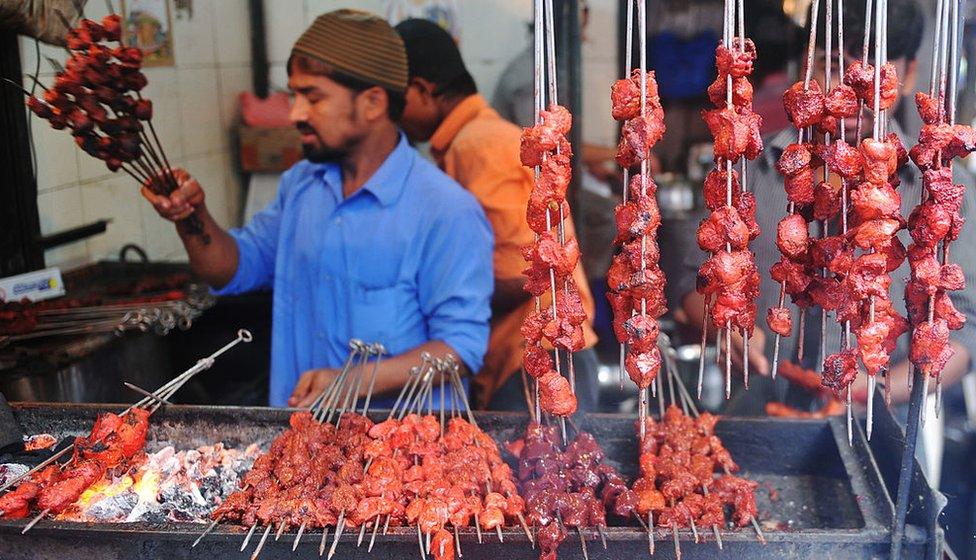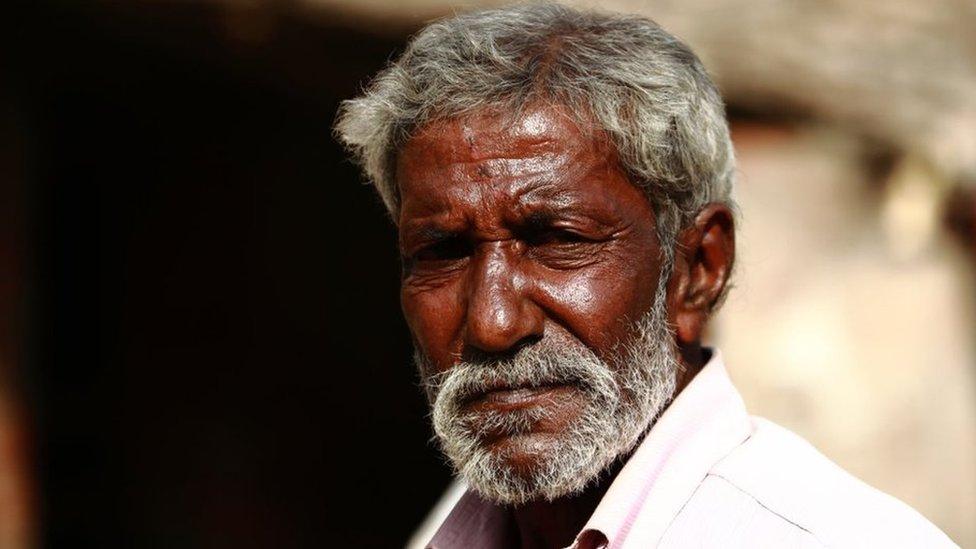Navratri: Outrage as Delhi meat shops shut for Hindu festival
- Published

The majority of Indians are meat-eaters
Many meat shops in the Indian capital, Delhi, have been closed for two days after civic officials asked them to remain shut for Navratri - a Hindu festival observed over nine days.
Mayors of south and east districts said most people did not eat non-vegetarian food during the festival and many had complained that they did not like seeing meat being cut in the open.
The move has riled many who have taken to social media to express outrage.
Many say it violates India's pluralism.
During the nine-day festival, devout Hindus usually fast or abstain from eating meat, and even avoid using garlic, onions and certain spices in their food.
The Indian capital is governed by Chief Minister Arvind Kejriwal's Aam Aadmi Party which has not issued any official orders asking meat shops to shut. The mayors who've called for the shops to remain shut until 11 April belong to Prime Minister Narendra Modi's Hindu nationalist Bharatiya Janata Party (BJP).
Their move has drawn sharp criticism online with some pointing out that someone's choice to abstain from meat should not infringe on another's freedom to eat meat or earn a livelihood.
MP and Trinamool Congress party leader Mahua Moitra strongly reacted to the order saying "the Constitution allows me to eat when I like".
Allow X content?
This article contains content provided by X. We ask for your permission before anything is loaded, as they may be using cookies and other technologies. You may want to read X’s cookie policy, external and privacy policy, external before accepting. To view this content choose ‘accept and continue’.
Former Jammu and Kashmir chief minister Omar Abdullah reacted to the announcement asking if it was okay to ban every non-Muslim resident or tourist in Muslim-majority areas from eating in public during Ramadan, the Muslim month of fasting.
Allow X content?
This article contains content provided by X. We ask for your permission before anything is loaded, as they may be using cookies and other technologies. You may want to read X’s cookie policy, external and privacy policy, external before accepting. To view this content choose ‘accept and continue’.
Others asked why the sale and purchase of onions and garlic were not banned during this period. "Why stop at just meat?, external"
One Twitter user said: "Meat will continue to be served in hotels. Online vendors will continue to deliver meat. But the Hindu sentiment will be hurt by the meat shops run by poor Muslim vendors."
Allow X content?
This article contains content provided by X. We ask for your permission before anything is loaded, as they may be using cookies and other technologies. You may want to read X’s cookie policy, external and privacy policy, external before accepting. To view this content choose ‘accept and continue’.
In a letter issued on 4 April, the mayor of the South Delhi Municipal Corporation (SDMC), Mukkesh Surayan said devotees' "religious beliefs and and sentiments are affected when they come across meat shops or when they have to bear with the foul smell on their way to offer prayers".
Allow X content?
This article contains content provided by X. We ask for your permission before anything is loaded, as they may be using cookies and other technologies. You may want to read X’s cookie policy, external and privacy policy, external before accepting. To view this content choose ‘accept and continue’.
"During Navratri, 99% of households in Delhi don't even use garlic and onion, so we've decided that no meat shops will be open in south [municipality]," Mr Suryan told ANI news agency adding that fines would be imposed on "violators".
The mayor of east Delhi, Shyam Sunder Aggarwal said that "if anyone is selling meat in this period, it would be either stale or slaughtering done through illegal means. So, I have ordered that 16 teams be formed to keep a very watchful eye on such traders and take actions accordingly".
Mr Suryan told PTI news agency that an order would be issued soon. This has led to some confusion on the ground with reports that many shopkeepers had not received any orders yet, external.
However, some shopkeepers across several south Delhi neighbourhoods kept their businesses closed out of fear, the Indian Express reported, external. There are around 1,500 registered meat shops which fall under the south Delhi municipal corporation.
Despite common belief that India is a largely vegetarian country, research shows that only about 20% of Indians are actually vegetarian.
Hindus, who make up 80% of the country's population, are major meat-eaters. Delhi, where only a third of residents are thought to be vegetarian, may well deserve its reputation for being India's butter chicken capital.
Food writer Soity Banerjee cooks the world's oldest curry
Related topics
- Published4 April 2018
- Published30 March 2017
